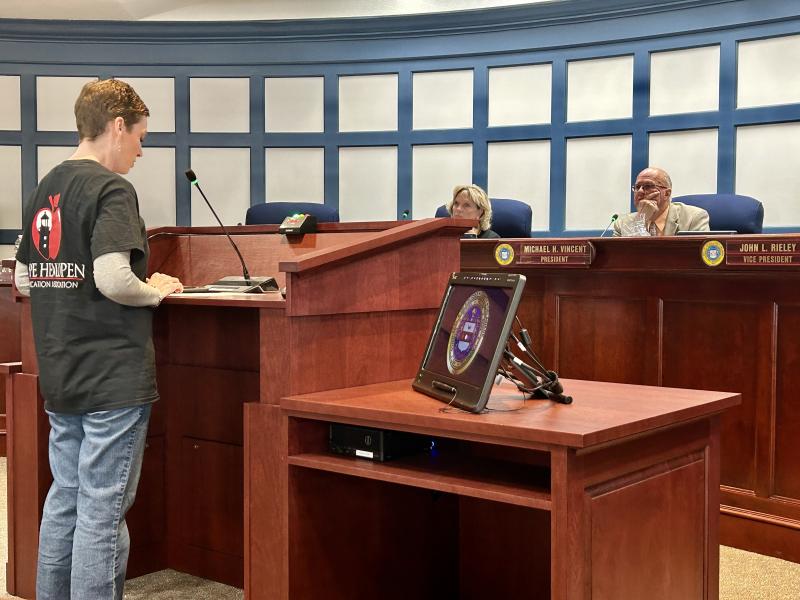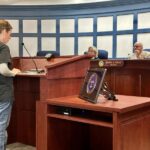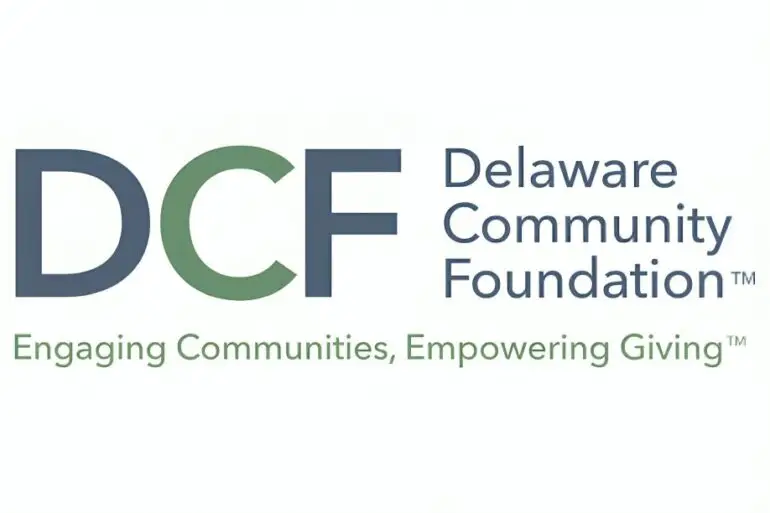-
 play_arrow
play_arrow
Radio Rehoboth

Leaders from two school districts addressed Sussex County Council Oct. 29, urging them to support a voluntary school assessment to address population growth caused by new development.
Wearing a Cape Henlopen Education Association T-shirt, CHEA President Christy Wimmer said if a VSA had been implemented in the 2020 fiscal year, Cape could have received about $62 million to offset the cost of new building construction and renovation to accommodate the growth in student population.
“Councilman Mark Schaeffer has stated that the VSA mostly affects low- and middle-income families,” she said. “He said, ‘People that are trying to get into a $200,000 house to buy into the American Dream are going to be prohibited.’ This statement is inherently false because the VSA fee is only on new construction homes, and the last time I checked Zillow, there are no longer any $200,000 new construction homes being built in Sussex County.”
Schaeffer also made a false statement, she said, when he stated his back-of-the-napkin calculations would create a $17,000 to $18,000 tax per home that would be unaffordable.
“This statement is also false because the VSA is not a tax,” Wimmer said. “The VSA is a fee that does not have to be passed on to the homebuyer.”
Conversely, she said, referendums are taxes that all residents pay, regardless if they have a new or established home. Because of the county’s lack of action, districts must rely on referendums, she said, noting Cape struggled to pass two referendums last year.
“I invite all county council members to visit Cape Henlopen High School and see how students are sitting on classroom floors and windowsills because there aren’t enough desks or chairs to accommodate all students,” she said.
Wimmer invited council to spend time in school hallways during class change to see how crowded it gets before she was cut off by council President Mike Vincent for speaking to the time limit.
Before the meeting, County Administrator Todd Lawson explained to students visiting council on a field trip that Schaeffer would not be at the meeting that day because he was out campaigning for re-election.
In January, council determined without a formal vote that a VSA would be a new tax and they would not move forward with an ordinance to create a school impact fee for new development.
Rather, the VSA is a fee per home paid by developers to the Delaware Department of Education that can be used by districts at capacity for major and minor capital improvements.
Cape school district special education teacher Heather Farmer said Sussex County schools have missed out on about $100 million that could have been generated by a VSA.
Programs like Cape’s Sussex Consortium and Indian River School District’s Howard T. Ennis School are funded differently, she said, and when these students are able to be mainstreamed into general education classrooms in public schools, those classrooms don’t receive extra funds.
So, she said, if a 25-student classroom gets five additional students from Sussex Consortium, those students are not counted toward the annual Sept. 30 unit count and lead to overcrowding, which is not fair to students or teachers.
Milford School District Chief Operating Officer Sara Hale, who is also the president of the Delaware Association of School Business Officials, urged council to implement a VSA or school impact fee like those that currently benefit Kent and New Castle counties.
Hale said Milford School District is unique in that it has territory in both Kent and Sussex counties. The district has been fortunate to receive revenue from the Kent County impact fee program for its Kent area, she said.
“This revenue has been instrumental in supporting our major and minor capital projects and also in tax decreases, allowing Milford to lower its overall tax rate for the past eight years and fully fund our Milford Middle School project with no increase or impact to these critical revenues,” she said.
For two years, Milford has unsuccessfully sought capital funding for the expansion or renovation of its overcrowded high school, she said. Since 2018, Milford’s student population has grown 2% to 3% each year, she said, and the district will implement a major reconfiguration next year to try to mitigate the effects of long-term growth.
Hale urged council to take the time to fully understand the VSA and school impact programs, and the positives they bring to current taxpayers, and urged council and county voters to consider infrastructure needs, including schools, before continuing to support further development without critical revenues needed for stability.
“Having to increase taxes to our current residents to fund growth that is out of their control is not only unfair, but it’s also proven to be an unsuccessful way of funding school projects, leaving school districts struggling to provide the necessary space for all students,” she said.
Cape Henlopen School District Director of Operations Jason Hale said he has been a school finance director for 25 years, with 20 of those years in New Castle County, and he can personally attest to the significant impact developer fees have had on managing growth.
“These measures have been successfully implemented in both Kent and New Castle counties, ensuring that the costs associated with development are more equitably shared,” he said.
Currently, he said, the burden of growth is placed solely on the hardworking taxpayers of Sussex County.
“In New Castle and Kent counties, these fees help alleviate that burden, and enable school districts and other public services to accommodate the increase in demands that comes with growth,” he said.
Despite Sussex County experiencing the most growth in the state, it is the only county without such a program, he said.
“Every day without a fee on developers has a strain on Sussex County taxpayers,” he said. “I understand some express concerns, mistakenly calling these fees a tax, but I want to be clear. This is not a tax. It’s a way to ensure developers contribute fairly to the infrastructure and communities they benefit from.”
Developers profit from the community and often use school districts to market their homes, Hale said.
“As a licensed, certified public accountant, I can confidently say calling these fees a tax is simply incorrect,” he said. “The truth is, it would actually help lower the tax burden on our residents by distributing the cost of growth more fairly.”
Some say such programs would increase the cost of homes, which would only happen if developers choose to pass on the fees to new home buyers.
“If they do, it shows they’re continuing to profit off the backs of our current and future taxpayers,” he said.
In a related public comment, Milford resident Adele Jones said she is devastated by the loss of forest and farmland.
“As I have said many times, the overdevelopment of Sussex County is ruining my quality of life, and when are you guys going to get some ordinances in law that helps stem this growth?” she said.
After public comment, council moved on to the regular agenda.
Go to Source:https://www.capegazette.com/article/cape-milford-school-leaders-urge-county-enact-vsa/283098
Author: Ellen Driscoll
Written by: RSS
Similar posts
Chart
Top popular

News Briefs 10/17/23
Board of Commissioners Workshop & Special Meeting – November 6

Six Sussex road projects considered in latest CTP
NFL Week 17 highlights: Packers, 49ers, Saints, Steelers win, Cardinals stun Eagles
Knicks vs. Cavaliers prediction, odds, line, spread, time: 2023 NBA picks, Nov. 1 best bets from proven model
Copyright 2023 East Sussex Public Broadcasting, Inc.






